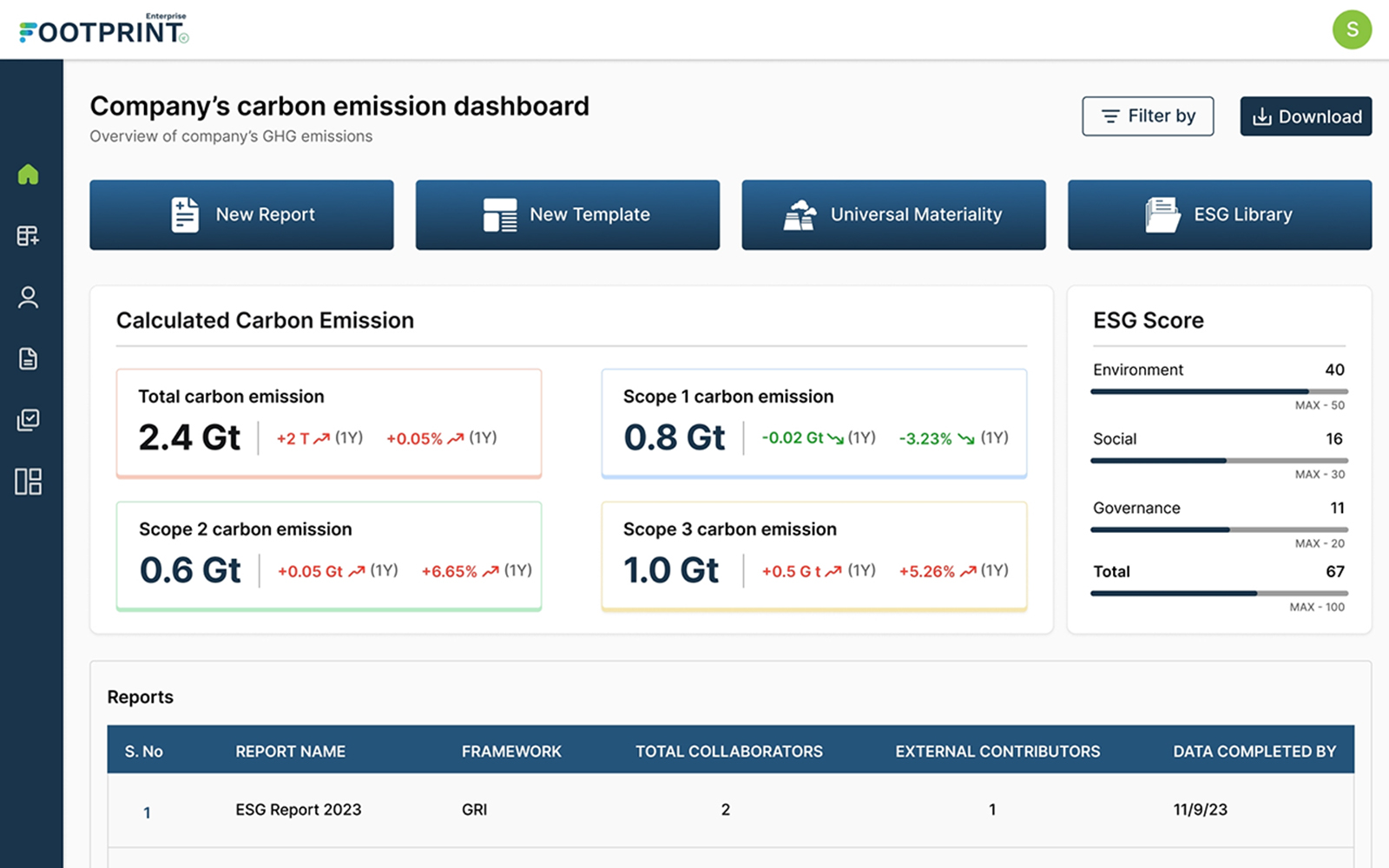TRST01 ESG Scorecard Rationale and Approach
An Essential Tool for Sustainable Business
11th October 2023

TRST01’s Pioneering Vision
In today’s rapidly changing world, businesses are expected to do more than generate profits. With ever-evolving expectations, ESG (Environmental, Social, and Governance) has emerged as the epitome of corporate responsibility and sustainability. The importance of these parameters is increasing, and the ESG Scorecard Model is becoming a critical tool for businesses. TRST01’s advanced model combines traditional metrics with innovation, making it a leader in this change.
Demystifying the ESG Scorecard Model:
The ESG Scorecard Model is more than just a checklist; it’s a comprehensive framework scrutinising a company’s societal impact. This is broken down into:
- Environmental Metrics: These dive deep into a company’s interaction with the environment. This involves understanding its carbon footprint, energy efficiency measures, waste management strategies, and environmental commitment.
- Social Parameters: These offer insights into a company’s societal impact. The focus here is on its relationships — with employees, suppliers, consumers, and the broader community. This could encompass labour practices, community outreach initiatives, and other societal engagements.
- Governance Factors: This involves a deep dive into the company’s internal mechanisms, including leadership practices, shareholder relationships, internal audits, and overall organisational transparency.
However, with ESG considerations becoming increasingly mainstream, what sets TRST01’s model apart from the rest?
TRST01’s Rationale for ESG Scorecard:
TRST01’s ESG Scorecard Model stands out due to its distinctive and thoughtful 5-step rationale:
- Holistic Data Collection: A complete data assimilation commitment is at the heart of TRST01’s approach. The model delves into every possible source, from public disclosures and company communications to industry-specific nuances and controversies. This exhaustive approach guarantees unparalleled transparency and pushes companies towards accountable actions.
- Relativity and Industry Context: Recognising that industries differ in their challenges and priorities, TRST01’s model contextualises evaluations. By juxtaposing a company’s performance against industry benchmarks, the evaluations become more meaningful and grounded in real-world context.
- Risk-Centric Evaluation: Every company operates within a web of risks that span environmental, socio-political, and industry-specific challenges. TRST01’s model highlights these risks, assessing a company’s resilience and strategies to mitigate potential ESG-related challenges.
- Dynamic Reassessment: The business realm is in constant flux, and TRST01 recognises this dynamic. Their model emphasises the need for regular updates, ensuring that evaluations remain attuned to global shifts and emerging challenges.
- Structured Scoring and Transparency: TRST01’s commitment to clarity culminates in the final ESG score. After rigorous internal evaluations, this number is made available to stakeholders, thereby championing transparency and informed decision-making.
TRST01’s model is more than just a tool; it’s a visionary approach that provides businesses with a comprehensive blueprint to enhance their sustainability practices. The model envisions a future where companies can flourish commercially while also becoming exemplary stewards of societal and environmental welfare.

The Strategic Incorporation of ESG Scorecard:
Modern companies realise that ESG principles aren’t just checkboxes but integral to long-term success. By weaving these principles into the fabric of their strategy, companies can make more informed decisions, optimise their operations, and carve out a unique space in a competitive marketplace.
The Footprint ESG Scorecard, TRST01’s signature offering, is positioned to redefine the ESG landscape. Seamlessly blending traditional methodologies with the latest technological advances offers real-time insights into a company’s ESG commitment. This holistic approach ensures that assessments aren’t just snapshots of a moment in time but continuous evaluations that mirror real-world dynamics.
The Future of ESG Scorecards and Their Integral Role in Business:
As we advance into a future where corporate responsibility becomes synonymous with corporate strategy, ESG scorecards, especially models like TRST01’s, will play a pivotal role. Such tools, which seamlessly combine evaluative metrics with forward-thinking innovation, will be vital in guiding businesses towards holistic success.
Moreover, with growing societal emphasis on sustainability, transparency, and corporate responsibility, businesses that adopt and adhere to comprehensive ESG frameworks will undoubtedly be better positioned in the market. They will attract ethically-minded investors and resonate with a consumer base that’s increasingly valuing sustainability.
The Broader Implications of ESG-Driven Business:
Businesses embracing ESG strengthen their reputation and brand value and create meaningful societal change. Companies prioritising these criteria will likely experience long-term benefits, including risk reduction, increased stakeholder trust, and access to a broader range of investment opportunities. As environmental crises, social inequities, and governance challenges continue to take centre stage in global discussions, the significance of the ESG model in corporate strategy cannot be understated.
TRST01’s Outlook:
TRST01’s ESG approach emphasises evolution, not just assessment. Their ESG Scorecard Model provides actionable insights to help companies move from reactive compliance to proactive betterment. With dynamic reassessment, TRST01 enables companies to lead and innovate in the global sustainability conversation.
Empowering Stakeholders:
Beyond the companies themselves, the real power of the ESG Scorecard Model lies in its capacity to empower stakeholders. From investors and employees to consumers and communities, an ESG-focused approach provides transparency and insight, enabling all involved parties to make informed decisions. It helps investors identify businesses that align with their values, aids consumers in supporting responsible brands, and empowers employees to work for companies that prioritise sustainable and ethical practices.
Final Thoughts:
In today’s business landscape, Environmental, Social, and Governance (ESG) criteria are gaining more significance. Companies that integrate these criteria into their core values not only benefit financially but also make a positive impact on society and leave a lasting legacy. The ESG Scorecard Model developed by TRST01 is a prime example of the transformative power of ESG. With its detail-oriented methodology and forward-thinking approach, it serves as a compass for businesses worldwide as they navigate the complexities of the 21st century. Models like TRST01’s are crucial in guiding companies towards a profitable, sustainable, ethical, and just future.
Recent Comments
Recent Posts
- Driving Global Impact: Regulation, Technology, and Adoption July 14, 2024
- Blockchain Revolutionising Provenance Global Supply Chains July 11, 2024
- Supply Chain Innovation TRST01Chain June 18, 2024
- Blockchain for Sustainability June 14, 2024
- EUDR Coffee : Between the Cup and the Lip June 9, 2024
- EUDR and India Rubber Export May 25, 2024
- Data Driven Sustainability April 28, 2024
- Paradigm Shift in ESG April 14, 2024
- ESG Beyond the Reports March 21, 2024
- The Kenko Eggs A Case Study February 18, 2024
- New Frontier : Carbon Broader Adjustment Mechanism (CBAM) January 27, 2024
- Sustainable Transformation Future ESG Management January 21, 2024
- EUDR Compliance in Indian Trade January 7, 2024
- The Indian Coffee Story : Brewing Harmony December 16, 2023
- The Rubber Story : Between Growth and Sustainability December 10, 2023
- The 4R Strategy : Roadmap to Sustainable Growth December 3, 2023
- Sustainable Indian Coffee: A EUDR Perspective November 10, 2023
- Climate Tech and SDGs: Unlocking Potential October 21, 2023
- ESG Scorecards : TRST01’s Vision October 11, 2023
- The Imperative of Carbon Accounting October 8, 2023
- TRST01Chain on International Coffee Day October 1, 2023
- Footprint Lite – Embracing SME September 24, 2023
- Footprint ESG – Embracing Enterprise September 14, 2023
- Empowering Tomorrow: Innovation, Pivoting, and Sustainability at TRST01 August 27, 2023
- TRST01Chain for Scope 3 Reporting August 12, 2023




